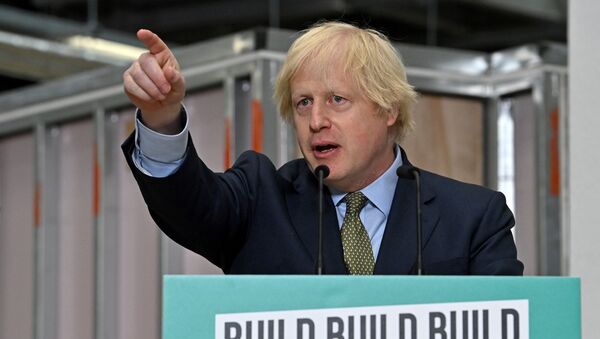“It sounds positively Rooseveltian,” UK Prime Minister Boris Johnson was expected to, but eventually chose not to say today, of his cherished mass spending programme.
Franklin Roosevelt is widely credited for towing the American nation out of the Great Depression through financial reforms and a series of public work projects. His New Deal helped bring unemployment down from 24.9 percent in 1933, the year when he took office, to 9.9 percent in 1941, when the United States entered WW2.
Away from ‘Thatcherism’
Johnson’s key promise in the December 2019 election, which got somewhat overshadowed by the Brexit tagline, was to invest £100 billion ($123bn) over the next five years in roads, rail and other infrastructure projects, notably in the Labour Party’s strongholds across the Midlands and the north of England.
The COVID-19 pandemic, which left more than one-in-four UK workers on government support has made that investment all the more pressing.
“Personally, I think the fact that Johnson is talking about an FDR-style stimulus package is great news, and it shows that there has at least been an ideological shift in the Conservatives’ direction away from neoliberal Thatcherism and towards One-Nation Toryism,” says Dr Roslyn Fuller, director and founder of the think tank Solonian Democracy Institute. “That in itself is an enormous change from previous governments.”
The prime minister has indeed pledged a programme that is similar to Roosevelt’s, in style at least. It includes investments in construction or upgrades of schools, roads, hospitals and other infrastructure with a major revamp of planning rules to speed up the projects and a strategy targeting further spending to be unveiled in the autumn.
Smaller than it seems
As for the size, there is less Roosevelt and more Thatcher in it. The “build, build, build” programme so far is worth £5 billion ($6.2 billion), which is just 0.2 percent of Britain’s 2019 GDP. This compares with $41.7 billion spent under the New Deal, which represented around 40 percent of the US economy before the Great Depression and equals more than $800 billion in today’s terms.
Boris Johnson’s plan is also much less ambitious than Germany’s $146-billion stimulus package (about 4 percent of its GDP) and Spain’s $170-billion public investment plan (12 percent of GDP).
It remains to be seen whether Britain’s just-announced recovery plan “really is a New Deal that is as expansive as FDR's was, or if it is a New Deal-lite,” says Dr Fuller.
“While £5 billion sounds like a lot, it is a small proportion of the UK's total national budget. However, it is also only a small proportion of the Tories' total spending promises…It will be interesting to see if that will change over the course of future budgets or if they stick with it.”
Johnson has promised no further rises in income tax and VAT, as well as tax breaks for high earners, so it is unclear how exactly the UK government, which is suffering from record budget deficit, will source the funds for investments.
Dr Fuller suggests: “The UK has been foregoing billions of pounds every year in tax evasion and tax avoidance, and unlocking this money, rather than placing the spending burden on working people and small businesses will, I believe, put the UK on a better long-term footing.”
The Labour party has already called for an emergency budget to be released next month as unemployment levels are expected to soar once the job retention scheme ends in October putting more stress on the budget.
“To focus on infrastructure spending is an appropriate fiscal policy response, but Johnson has to meet three tests,” says Iain Begg, professor at the European Institute of the London School of Economics and Political Science.
“First, what he proposes has to be ‘new money’ on a scale able to make a difference in macroeconomic terms, not previous announcements re-packaged. Second, there needs to be an emphasis on projects that can happen rapidly, so that workers are either kept in jobs or re-hired soon.”
The projects included in the programme, Begg adds, should also contribute to longer-term goals, including environmental sustainability. The UK’s green campaigners have already called out the plan for lacking new measures to achieve the country’s goal of net zero carbon emissions by 2050.
“The obvious fear is that, for all the talk of a Rooseveltian New Deal, neither the scale nor the immediacy of the proposed fiscal stimulus will be adequate,” Begg warns. “In addition, attention has to be paid to implementation, because promises alone will not suffice.”
What else could Johnson do?
The prime minister has ruled out any austerity measures, but there are concerns that the government is not in a good position for mass spending.
“Boris Johnson’s spending plans are hugely reckless given the dire state of the UK’s public finances. Britain could easily become another Greece or Italy – plagued by unsustainable debts and economic stagnation – if the government fails to get a grip on wasteful expenditure,” says Richard Wellings, acting research director at the British-based Institute of Economic Affairs.
He believes that rather than accelerate infrastructure projects, the governmnet should “draw up a list of poor-value schemes to scrap”, which could include the controversial High Speed 2 rail line and the Trident nuclear weapons programme.
“The government can best help the economy recover by getting out of the way,” says Wellings. “It needs to light a bonfire of red tape to remove the rules and regulations that are strangling growth. Getting public debt under control will also help by building confidence and encouraging long-term private investment.”
“The Prime Minister is deeply mistaken if he thinks FDR’s New Deal saved the US economy. In fact it deepened and lengthened the Great Depression by hindering the adjustment of markets to new conditions. It also led to a shift in the relationship between government and big business, setting in train the crony-capitalist rot that led to the rapid relative decline of the US in recent decades.”




